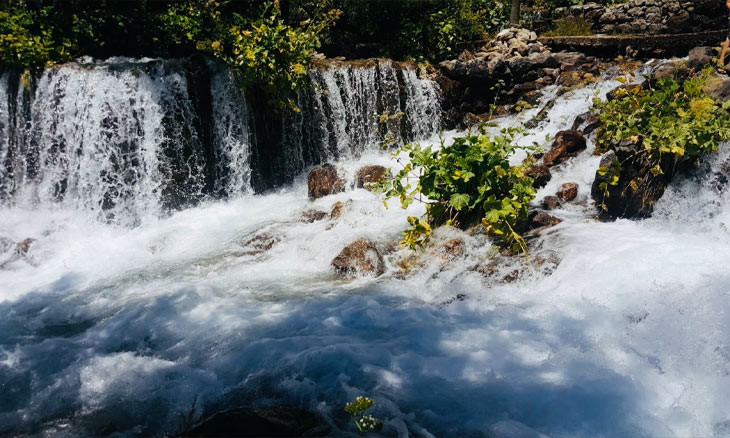Locals protest government decision to downgrade protection status of springs sacred for Alevi faith in eastern Turkey
Locals and civil society organizations have met at the Munzur River in eastern Turkey, a sacred site for the Alevi community of the Dersim province, to protest the government's decision to downgrade its protection status.
Duygu Kıt / Gazete Duvar
Civil society representatives on Nov. 1 convened at the Munzur Springs in eastern Turkey’s Dersim province to accompany a legal delegation inspecting the area to downgrade its protection status and make a case for protecting the natural site.
The Turkish Environment, Urbanization, and Climate Change Ministry announced on July 28, 2023, that the valley floors of the Munzur and Pülümür Valleys, along with the area containing the Munzur Springs, had been registered as a "Qualified Natural Protection Area" with the approval of the ministry authorities.
This decision downgraded the protection status of the Munzur Springs, which had been a "First Degree Natural Site." The Union of Chambers of Turkish Engineers and Architects (TMMOB) filed a lawsuit against the ministry for the annulment of the decision. As part of the case, a court delegation on Nov. 1 conducted an inspection at the Munzur Springs.
The delegation carried out the inspection with an expert committee that included an environmental engineer, hydrogeologist, geomorphologist, ecologist, and landscape engineer. Participants included the pro-Kurdish Peoples’ Equality and Democracy (DEM) Party Dersim Deputy Ayten Kordu, the Dersim Bar Association, Tunceli Chamber of Commerce and Industry, TMMOB Dersim Provincial Coordination, the Dersim Labor and Democracy Platform, Ovacık Mayor Mustafa Sarıgül, numerous political organizations, environmental associations, and locals.
Before the inspection, the Dersim Labor and Democracy Platform issued a press statement protesting the downgrade of the Munzur Springs' status. Erdal Kınaş read the statement on behalf of the platform. Kınaş stated that they would not allow the commercialization or development of Munzur and said, "Given its flora, fauna, ecological structure, and its cultural value as a religious center, Munzur Springs must be strictly protected for current and future generations. There is no legal basis for declaring it a 'Qualified Natural Protection Area,' and this decision should be annulled. We will continue our legal and social struggle against any development in Munzur Springs."
Following the platform’s statement, DEM Party Dersim Deputy Ayten Kordu and Ovacık Mayor Mustafa Sarıgül also spoke, emphasizing that the Munzur River is sacred in the Alevi faith and must be protected for ecological reasons, and they expressed their commitment to defending Munzur.
TMMOB Legal Counsel Ferhat Çelepkolu made a presentation to the delegation during the inspection. He said, "Science cannot be bounded by rigid lines. It is impossible to designate one part of a region as strictly protected while applying a different protection status to the source springs. We leave it to your discretion to assess the disruptive impact of any potential activities here.”
“As stated, there are differences between strictly protected areas and qualified natural protection areas. Construction is prohibited in strictly protected areas, but development could occur under the qualified natural protection status," the expert maintained.
Zeynel Kete, co-chair of the Democratic Alevi Associations, also made a presentation to the delegation about the springs’ religious and cultural significance for the Alevi people.
He said, "For thousands of years, the Munzur Springs have been sacred to our people. In the Alevi faith, which we refer to as Rea Haq, this place is almost like our genetic code. Our ancestors have worshipped here for centuries and even avoided smoking in the area out of respect for the air's purity. This place is our identity and should remain in its natural state.”
He added that the law should consider the sensitivity of the community when making a decision.


 Heavy machinery enters sacred Alevi grounds in eastern Turkey for state landscaping projectDomestic
Heavy machinery enters sacred Alevi grounds in eastern Turkey for state landscaping projectDomestic Construction kicks off on Alevi sacred grounds in eastern TurkeyCulture
Construction kicks off on Alevi sacred grounds in eastern TurkeyCulture Tender scheduled for hunting sacred eastern Turkey mountain goatsEnvironment
Tender scheduled for hunting sacred eastern Turkey mountain goatsEnvironment